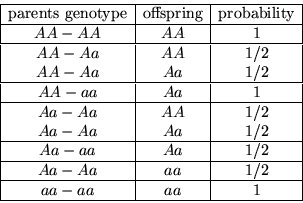
The aa genotype refers to the specific genetic makeup of an individual. Simply put, it signifies the presence of two recessive alleles for a particular trait. This genetic code plays a crucial role in determining various physical and biological characteristics in organisms. Understanding the implications of the aa genotype is essential in genetics research and breeding programs. Let’s delve deeper into the significance of the aa genotype and its impact on heredity and evolution.
The Fascinating World of the aa Genotype
Understanding the aa Genotype
Welcome to the world of genetics! Have you ever wondered why we look the way we do? Our genes play a significant role in determining our physical traits, and one essential aspect of genetics is the concept of genotypes. In this article, we will delve into the fascinating aa genotype and explore what it means in the world of genetics.
What is a Genotype?
Before we dive into the specifics of the aa genotype, let’s first understand what a genotype is. In simple terms, a genotype refers to the genetic makeup of an organism. It is the combination of alleles (different forms of a gene) that an individual has for a particular trait.
Introduction to Alleles
Alleles are alternative forms of a gene that can determine specific traits. For example, in the case of eye color, there are different alleles that may result in blue, brown, or green eyes. The combination of alleles present in an individual determines their genotype for that particular trait.
Understanding the aa Genotype
The aa genotype refers to a specific genetic configuration where an individual carries two copies of the same allele, denoted by ‘a.’ In this case, both alleles are identical, leading to the aa genotype. This genetic makeup can have implications on various traits and characteristics exhibited by an organism.
Occurrence of aa Genotype
The aa genotype is just one of the many possible genotypes that can exist for a particular gene. The likelihood of an individual having the aa genotype depends on factors such as inheritance patterns and the presence of dominant or recessive alleles.
Impact of aa Genotype on Traits
The aa genotype can influence how certain traits are expressed in an organism. Traits that are controlled by recessive alleles will only manifest when an individual carries two copies of the recessive allele, as is the case with the aa genotype.
Examples of Traits Influenced by the aa Genotype
Let’s explore some examples of traits that can be affected by the aa genotype:
- Hair Color
- Eye Color
- Height
- Blood Type
Understanding Inheritance Patterns
Inheritance patterns play a crucial role in determining the likelihood of an individual having the aa genotype. Different genes follow specific patterns of inheritance, such as autosomal recessive or autosomal dominant, which can influence the presence of the aa genotype in a population.
Role of the aa Genotype in Genetics Research
Researchers and geneticists study genotypes like aa to better understand how genes are inherited and how they contribute to the diversity of traits observed in populations. By examining the aa genotype and its effects on different traits, scientists can unravel the complexities of genetics.
The aa genotype is a crucial concept in genetics that sheds light on how specific traits are inherited and expressed. Understanding genotypes like aa helps us appreciate the complexity of genetics and the role genes play in shaping our physical characteristics.
GENOTYPE
Frequently Asked Questions
What is the significance of having an aa genotype?
An aa genotype refers to an individual having two copies of the recessive allele ‘a.’ This genotype often indicates a specific genetic trait or characteristic that is expressed in the person. Understanding the implications of this genotype can provide insights into inherited conditions or susceptibilities.
How does an aa genotype differ from other genotypes?
An aa genotype differs from other genotypes in that it consists of two identical recessive alleles, whereas other genotypes may involve a combination of dominant and recessive alleles. This difference in genetic makeup can influence how certain traits or diseases are inherited and expressed.
Can having an aa genotype impact an individual’s health?
Having an aa genotype can potentially impact an individual’s health depending on the specific trait or condition associated with the recessive allele ‘a.’ Certain genetic disorders or susceptibilities may be linked to this genotype, highlighting the importance of genetic testing and personalized healthcare.
Final Thoughts
In conclusion, the aa genotype plays a crucial role in determining certain genetic traits. Individuals with the aa genotype exhibit specific characteristics that differ from other genotypes. Understanding the impact of the aa genotype can lead to better insights into inherited conditions and disease susceptibility. Overall, the significance of the aa genotype highlights the complexity and variation present in human genetics.



